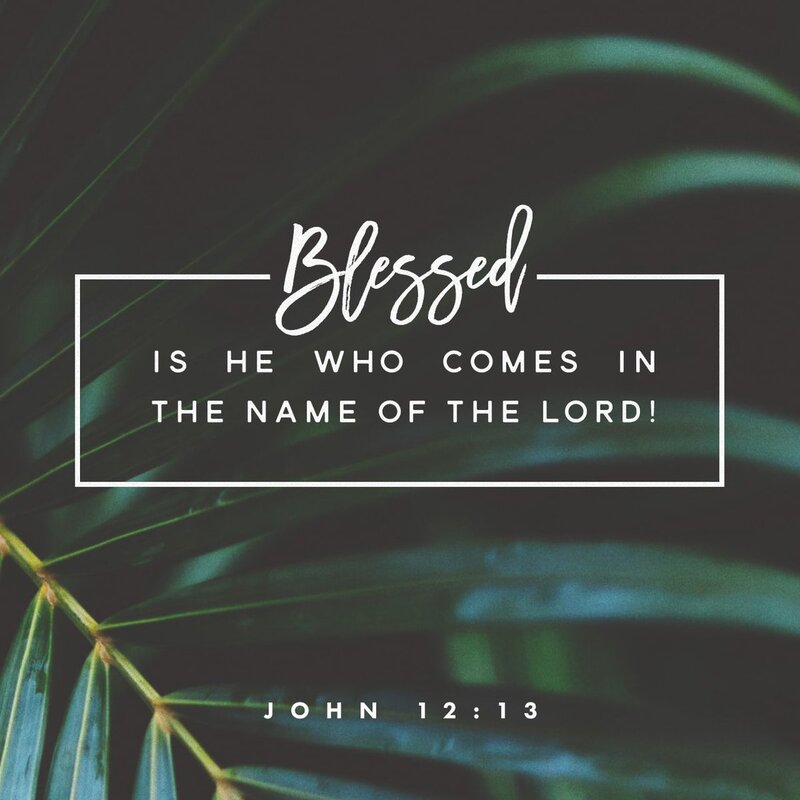
Palm Sunday
Jesus' Triumphal Entry
to
Jerusalem
Palm Sunday occurs on the Sunday before
Easter
This celebration commemorates
Jesus' triumphal entry into Jerusalem,
mentioned in each of the four Gospels.
Jesus entered the city knowing He would be
tried and crucified and welcomed
His fate
to rise from the grave and save us from sin!
Palm Sunday
marks the beginning of Holy Week,
the remembrance of
Jesus' last days
Palm Sunday is often observed with the blessing and sharing
of palm branches symbolizing the branches placed in front of
Christ as he entered Jerusalem
Let us praise God for sending His Son to earth,
Jesus' sacrifice for our sins, and our eternal life
in
Christ through faith!
Palm Sunday
Jesus Comes to Jerusalem as King - The Triumphal Entry
Now when they drew near to Jerusalem and came to Bethphage, to the Mount of Olives, then Jesus sent two disciples, saying to them, "Go into the village in front of you, and immediately you will find a donkey tied, and a colt with her. Untie them and bring them to me. If anyone says anything to you, you shall say, 'The Lord needs them,' and he will send them at once." This took place to fulfill what was spoken by the prophet, saying, "Say to the daughter of Zion, 'Behold, your king is coming to you, humble, and mounted on a donkey, and on a colt, the foal of a beast of burden.'" 6 The disciples went and did as Jesus had directed them. They brought the donkey and the colt and put on them their cloaks, and he sat on them.
Most of the crowd spread their cloaks on the road, and others cut branches from the trees and spread them on the road. And the crowds that went before him and that followed him were shouting, "Hosanna to the Son of David! Blessed is he who comes in the name of the Lord! Hosanna in the highest!" And when he entered Jerusalem, the whole city was stirred up, saying,
"Who is this?"
And the crowds said,
"This is the prophet Jesus,
from
Nazareth of Galilee."
- Matthew 21:1-11
The Old Testament prophecied Palm Sunday in Zechariah 9:9 - "Rejoice greatly, O daughter of Zion! Shout aloud, O daughter of Jerusalem! Behold, your king is coming to you; righteous and having salvation is he, humble and mounted on a donkey, on a colt, the foal of a donkey."
Read more Palm Sunday Scriptures, including the retold accounts in the gospels of Mark, Luke, and John.
Palm Sunday in 2023This year, Palm Sunday will be on April 2nd, 2023. This begins Holy Week, leading to Easter on April 9th, 2023.
See the timeline and meaning of Holy Week: When Is Holy Week in 2023? Holiday Dates for Easter and More
Psalm 118 is one of the Hallel psalms, also called the “Egyptian Hallel,” a short series of psalms (Psalm 113—118) incorporated in the celebration of the Passover. The final psalm is sung in the festive processional as the people enter the temple gates to worship. In Psalm 118:26, the congregation welcomes the vindicated king, singing, “Blessed is he who comes in the name of the LORD. From the house of the LORD we bless you.”
Originally, this psalm depicted Israel’s exodus journey from Egypt to their eventual arrival at Mount Zion. But its celebratory welcoming of the king was ultimately fulfilled in Jesus Christ’s triumphal entry into Jerusalem on Palm Sunday. All four gospels quote Psalm 118:26: “Jesus was in the center of the procession, and the people all around him were shouting, ‘Praise God for the Son of David! Blessings on the one who comes in the name of the LORD! Praise God in highest heaven!’” (Matthew 21:9, NLT; see also Mark 11:9; Luke 19:38; John 12:13).
The term translated “blessed is” comes from the Hebrew word barukh (literally “to bless”) and is most often used of God. But in Psalm 118:26 it speaks of the king figure who comes in God’s authority. Faithlife Study Bible explains that barukh “describes bestowing someone with special power or declaring Yahweh to be the source of special power. In that regard, it means praising Yahweh for who He is” (Barry, J. D., et al, entry for Psalm 103:1, Lexham Press, 2012, 2016).
With the words, “Blessed is he who comes in the name of the Lord,” the ancient psalm praises God for who He is: “The LORD is God, and he has made his light shine on us” (Psalm 118:27). The blessing also forecasts His future coming as Israel’s Messiah. During passion week, we hear the echo, “Blessed is he who comes in the name of the Lord,” as the people of Christ’s day recognize Jesus as the long-awaited One.
Earlier, when Jesus lamented over Jerusalem, He predicted to the Pharisees, “Look, your house is left to you desolate. I tell you, you will not see me again until you say, ‘Blessed is he who comes in the name of the Lord’” (Luke 13:35). Jesus identified Himself as the “stone the builders rejected” (Psalm 118:22; cf. Matthew 21:42; Mark 12:10; Luke 20:17) who would bring salvation to all who prayed to Him, “Save us, Lord!” (Psalm 118:2). Through His crucifixion and resurrection, Jesus was the “living stone rejected by men but in the sight of God chosen and precious” (1 Peter 2:4, ESV). He became the chief cornerstone (Acts 4:11; Romans 9:33), “and whoever believes in him will not be put to shame” Romans 10:11; cf. 1 Peter 2:4–8).
Jesus came in the “special power” of Yahweh. He was vested with all the authority of His Father God. Jesus spoke with God’s authority so that “the people were amazed at his teaching” (Mark 1:22). He drove out unclean spirits (Mark 1:21–28, 39; Luke 4:31–37), healed the sick, and forgave people’s sins (Matthew 9:1–8; Mark 2:1–12; Luke 7:48). Jesus controlled the elements (Matthew 8:23–27), raised the dead to life (John 11:38–44), and cleansed the temple (Mark 11:27–33), all by God’s mandate.
“All authority in heaven and on earth” was given to Jesus by His Father (Matthew 28:18), including the authority “to judge” (John 5:27) and to lay down His life in sacrifice for the sins of the world (John 10:18). God “granted him authority over all people that he might give eternal life to all those” God had given to Him (John 17:2).
“Blessed
is he who comes in the
name of the Lord”
is a declaration of praise and recognition that Jesus Christ is the Savior of the world who came in the power and authority of God. “I have come in my Father’s name,” said Jesus (John 5:43). All that Christ did was commissioned by His Father. Everything Jesus said and did was to glorify His Father and accomplish the work of making Him known to humans so that they might be saved (John 17:1–24).
Palm Sunday is the day we celebrate the triumphal entry of Jesus into Jerusalem, one week before His resurrection (Matthew 21:1–11). As Jesus entered the holy city, He neared the culmination of a long journey toward Golgotha. He had come to save the lost (Luke 19:10), and now was the time—this was the place—to secure that salvation. Palm Sunday marked the start of what is often called “Passion Week,” the final seven days of Jesus’ earthly ministry. Palm Sunday was the “beginning of the end” of Jesus’ work on earth.
Palm Sunday began
with
Jesus and His disciples
traveling over the
Mount of Olives.
The Lord sent two disciples ahead into the village of Bethphage to find an animal to ride. They found the unbroken colt of a donkey, just as Jesus had said they would (Luke 19:29–30). When they untied the colt, the owners began to question them. The disciples responded with the answer Jesus had provided: “The Lord needs it” (Luke 19:31–34). Amazingly, the owners were satisfied with that answer and let the disciples go. “They brought [the donkey] to Jesus, threw their cloaks on the colt and put Jesus on it” (Luke 19:35).
As Jesus ascended toward Jerusalem, a large multitude gathered around Him. This crowd understood that Jesus was the Messiah; what they did not understand was that it wasn’t time to set up the kingdom yet—although Jesus had tried to tell them so (Luke 19:11–12). The crowd’s actions along the road give rise to the name “Palm Sunday”: “A very large crowd spread their cloaks on the road, while others cut branches from the trees and spread them on the road” (Matthew 21:8). In strewing their cloaks on the road, the people were giving Jesus the royal treatment—King Jehu was given similar honor at his coronation (2 Kings 9:13). John records the detail that the branches they cut were from palm trees (John 12:13).
On that first Palm Sunday, the people also honored Jesus verbally: “The crowds that went ahead of him and those that followed shouted, ‘Hosanna to the Son of David!’ / ‘Blessed is he who comes in the name of the Lord!’ / ‘Hosanna in the highest heaven!’” (Matthew 21:9). In their praise of Jesus, the Jewish crowds were quoting Psalm 118:25–26, an acknowledged prophecy of the Christ. The allusion to a Messianic psalm drew resentment from the religious leaders present: “Some of the Pharisees in the crowd said to Jesus, ‘Teacher, rebuke your disciples!’” (Luke 19:39). However, Jesus saw no need to rebuke those who told the truth. He replied, “I tell you . . . if they keep quiet, the stones will cry out” (Luke 19:40).
Some 450 to 500 years prior to Jesus’
arrival in Jerusalem, the prophet
Zechariah had prophesied the event we now
call Palm Sunday:
“Rejoice greatly, Daughter Zion!
Shout, Daughter Jerusalem!
See, your king comes to you,
righteous and victorious, lowly and riding
on a donkey,
on a colt, the foal of a donkey”
(Zechariah 9:9).
The prophecy was
fulfilled
in every particular, and it was indeed a time of rejoicing, as Jerusalem welcomed their King. Unfortunately, the celebration was not to last. The crowds looked for a Messiah who would rescue them politically and free them nationally, but Jesus had come to save them spiritually. First things first, and mankind’s primary need is spiritual, not political, cultural, or national salvation.
Even as the coatless multitudes waved the palm branches and shouted for joy, they missed the true reason for Jesus’ presence. They could neither see nor understand the cross. That’s why, “as [Jesus] approached Jerusalem and saw the city, he wept over it and said, ‘If you, even you, had only known on this day what would bring you peace—but now it is hidden from your eyes. The days will come upon you when your enemies . . . will not leave one stone on another, because you did not recognize the time of God’s coming to you” (Luke 19:41–47). It is a tragic thing to see the Savior but not recognize Him for who He is.
The crowds who were crying out “Hosanna!” on
Palm Sunday
were crying out “Crucify Him!” later that week
(Matthew 27:22–23).
There is coming a day when
every knee will bow
and every tongue confess that
Jesus Christ is Lord
(Philippians 2:10–11).
The worship will be real then. Also, John records a scene in heaven that features the eternal celebration of the risen Lord: “There before me was a great multitude that no one could count, from every nation, tribe, people and language, standing before the throne and before the Lamb.
They were wearing white robes and were holding palm
branches in their hands” (Revelation 7:9, emphasis added).
These palm-bearing saints will shout,
“Salvation belongs to our God,
who sits on the throne,
and to the Lamb”
(verse 10), and who can measure sum of their joy?
Palm Sunday Calendar:
2023 — April 2





 RSS Feed
RSS Feed
























































